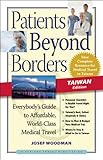Leading Indian Hospitals, Healthcare providers (both Modern Medicine and Traditional Indian Medicine), Travel and Medical Tourism Industry providers have come together to form an industry association - Indian Medical Travel Association (IMTA) that aims to work together to make India the leading global healthcare destination.
The phenomenon now popularly known as Medical Tourism is often cited as the next big opportunity for India after the IT outsourcing to earn billions of dollars in forex earnings and create jobs in the healthcare sector. So far only a select group of Indian hospitals have been making valiant attempts to market their services in international arena. More than a million overseas patients already treated at top Indian corporate hospitals like Apollo, Fortis, Wockhardt, Max, Manipal and many others have already proved to the world that the clinical quality, technology and cost proposition offered by India is unmatched. The capacity in super specialty segment Indian hospitals is expanding fast and there is no waiting period for local or overseas patients.
CII Mc'Kinsey study first reported on medical tourism as the billion dollar opportunity for India way back in 2002 and the steady growth in overseas patient arrivals has validated the potential. With a large number of new private super specialty hospitals and even integrated health cities coming up in India's top ten cities, India has the potential to become the global leader in the Medical Travel/ Outsourcing industry. Indian doctors and professionals are world renowned for their skills and the country has abundance of all the inputs like talented young manpower, local high quality manufacturing base for pharmaceuticals, technology hardware and software that makes the Indian costs for high end surgical procedures so attractive. The challenge really is on the non medical side, primarily on the marketing front and also to create infrastructure and services to support the growth of medical tourism.
Indian Medical Travel Association (IMTA) - a non profit body and a unified voice of the Indian healthcare (modern medicine as well as traditional Indian medicine) and travel industry is aimed at preparing India for facing the challenges of global competition and actualise the tremendous opportunity for India to become a leading global healthcare destination. Modern medicine as well as India's 5000 year old traditional therapies like Ayurveda, Siddha and Yoga can offer to the world an unbeatable healing package.
"IMTA would strive to help its members reach out in a cost effective manner to millions of our potential global consumers who reside on the other side of the globe in a different time and cultural zone and make them aware of the tremendous value that Indian healthcare offers. The fact is that prior to choosing a hospital, the international patients first decide on the country or the destination. Therefore we all must join hands to aggressively promote INDIA as a preferred global healthcare destination," Says Pradeep Thukral, Executive Director, Indian Medical Travel Association (IMTA)
The Government of India and its various arms are actively supporting the growth of medical tourism to India. In a message to IMTA, the Union Tourism Minister, Kumar Shailaja conveyed “This is indeed a commendable initiative and we all know the tremendous opportunity that Medical Tourism presents for India. On behalf of the Ministry of Tourism, I would like to provide all possible support this industry initiative and would like to wish IMTA and its members great success in their efforts.
Two years ago the Government of India introduced a special category of Visa called M Visa for foreigners desirous of coming to India for medical treatment. India's Ministry of Tourism has achieved phenomenal success in last five years with its much acclaimed "Incredible India "campaign that has multiplied the arrival of foreign tourists to India. The current year 2009 is being promoted by Indian Ministry of Tourism as "Visit India'" year and the ministry is keen to promote Medical Tourism. It has recently notified the Market Development Assistance (MDA) Scheme to eligible Medical Tourism players which enables them to get financial support for participation in overseas promotional events.


